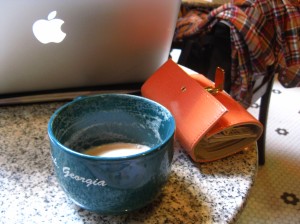 [an oak tree – not quite a magnolia]
[an oak tree – not quite a magnolia]
We had grown tired of the magnolia tree we used to sit in. It was taller than my family’s one-story ranch and considerably convenient for spying into the neighbors’ backyards. The uncomfortable truth was that, while large enough to saddle two very skinny nine-year-olds, the branches were not a favorable place for spending more than a few minutes in at a time. Knots in the branches dug at the backs of our bare legs and leaves provided equal parts shade and irritation. The tree was not the crux of our problem. Our combined energy levels had exiled us to the outdoors, and there were just some solutions nature in its intended state could not provide.
“I’ve got a plan,” my best friend confided one particularly muggy afternoon.
My friend was a twig-like blondie–a boy, before I knew the difficulty pseudo-sexual fascination tragically would cause for many of my other male friendships later on. At the time, we were able to reserve our flirtatious experimentation to pecks on the cheek next to the swing set (trite, yet, true). This game would quickly develop into a “I’m-going-to-kiss-you-if-you-don’t-give-me-my-way” war, supplemented often by the “I’m-going-to-dump-water-on-you-(etc.)” chase, both of which ended in me screaming, running inside and locking him outside of the house.
I suppose it’s a little obvious by now that I was quite the ruffian as a child. Now that my post-collegian stint in gender studies classes has fed my already budding feminist tendencies, I hesitate–and even am loath–to use the phrase “tom-boy,” but for lack of a better term I find myself stuck. Sufficed to say I lacked what would be considered gendered “feminine” qualities for a budding girl. I wore baggy shirts and draw-string shorts with sneakers (or bare feet–this was the south after all) which allowed me to scurry into a tree or onto my bicycle at a moment’s notice. The same friend once called me a tom-boy and I slapped the poor kid right across the face. Sweet justice, but, in retrospect, a little cruel. It left a red mark and he cried. I think I got away with it because no one saw and he was too ashamed to tell and reap the benefits that tattling would have provided. Friend: if you are reading this, I’m sorry.
Gender, sexual identity and torture techniques of young children are not the focus of this entry, however.
That being said, I think you now have a clearer picture of tiny me and her skinny blond friend: hyper, knobby, tanned, and insatiable.
Back to my tale.
“What’s your idea?” I couldn’t contain my interest.
My friend went on to explain that the blue dumpster which loomed in our caddy-corner neighbor’s yard was full of building supplies. The neighbors were adding a new section to their house and the temporary dumpster was full to the brim with pieces of flooring, tile, and–best of all–large planks of plywood.
We could see clearly into the dumpster from our tree: with the metal handle bars creating a ladder on the side we could easily slip in.
The plan was set: that Sunday, when the workers were on break and our neighbors at church, we would climb in, snatch ample supplies, and scurry away with no one the wiser. We would then proceed to build our ultimate creation: a honest-to-goodness clubhouse.
It was decided our clubhouse would go in my backyard since the dumpster was significantly closer to my house than his. It never once occurred to us that this might not bode well with my slightly over-protective parents for us to be digging through dumpsters. Nor did issues of broken glass, rusty nails, fiberglass, or, well, trespassing ever cross our minds. We had our heads set on one thing and one thing only, and nothing else was going to stand in our way.
That Sunday came as slowly as our birthdays–the night before I hardly slept.
He was at my house right at nine Sunday morning like we’d planned. We climbed into our tree and waited until nine-fifteen for the neighbors’ black SUV to slug around the corner and off to church. We felt like super-ninjas or Power Rangers…only, instead of fighting crime we were (technically) stealing.
Once the path was clear we bounced over the the dumpster, raging through it yelling and laughing as we found one treasure after another. A couple thrilling hours later we had collected all our supplies. We had a small pile in my tiny backyard and were ready to construct.
I remember we took our project very seriously, collecting nails we’d found littering their yard; using the special hammer my friend had been given for his last birthday; even drawing up semblance of blueprints on printer paper with markers.
What I don’t remember, however, is where my parents were that day or if we became exhausted lugging five-by-four sheets of plywood across two neighbors’ yards along with several other random items. I expect the latter was a non-issue since our little bodies were so coursing with adrenaline from the prospect of the clubhouse we didn’t have room for fatigue.
We stared at our newly sequestered booty for a while. There was some scuffling about how we were going to proceed from there–I had in my head a grand construction with several stories, bunk beds and a full replica of a kitchen; he had in mind something a little closer to a tangible goal. His idea won out in the end.
After hours of nailing and collapsing boards, we had a horrid little three-and-a-half sided box with sagging boards for a floor and no windows. The “roof” issue was resolved by placing another sagging plywood sheet over the top, blocking almost all light into the thing and causing the air to go from muggy to stifling inside our creature. But it was ours so it was beautiful.
The smell factor only became worse when we decided it needed a paint job. My friend had pulled from his father’s garage several cans of gray spray paint and one can of black.
“We can call it the ‘Galaxy,’” he said. He informed me he intended to paint its name on the side over the gray with the black.
“The ‘Galaxy’?” I asked, reproachful.
He groaned. He was tired of having to persuade me to see his side.
There was an argument which he eventually won since 1) I didn’t have a better alternative, and 2) our masterpiece did take residence in my backyard, not his, so he should have some say to make up for his initial loss.
“Fine,” I snapped, “but only if we paint the inside black like you said–but I get to use my glow-in-the-dark paint on the inside for the stars!”
“Why?”
“It’s the galaxy.” Obviously.
“Fine.”
“–and if we get to have a table!”
He growled. “Fine.”
We set to work.
We spent the next hour or so spraying the plywood, resulting in a sort of lumpy gray-brown with patches–an even bigger failure than our club…thing. Even we were becoming disappointed. It was not the glorious freedom-providing clubhouse we’d had in mind. Our tree was starting to look good again.
To top it all off, the glow-in-the-dark paints didn’t work because there was no light for them to charge inside the morbid structure; I think my friend even spelled “galaxy” wrong on the outside. G-A-L-E-X-Y.
The next day, we felt slightly betrayed when my father dragged the thing back to the dumpster–but only slightly. Even still, the offense we took was really just going through the motions for the effort we’d put in. It was a pathetic eulogy for an even more pathetic creation.
The magnolia tree served us just fine from then on until I moved to Maine the next spring.


